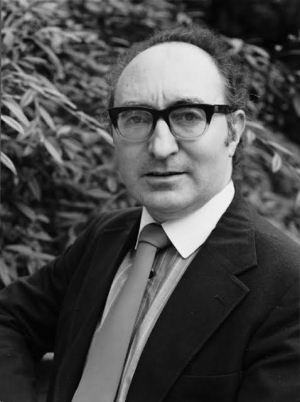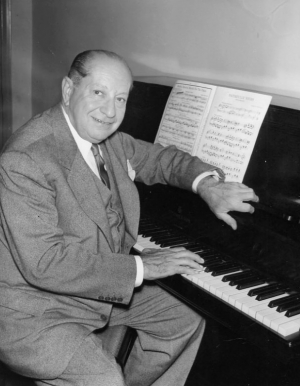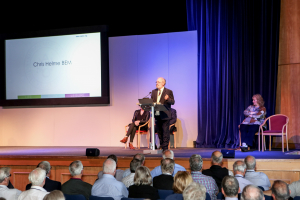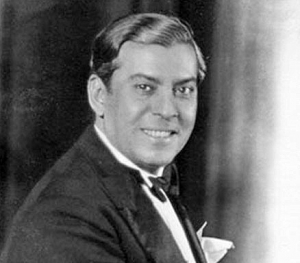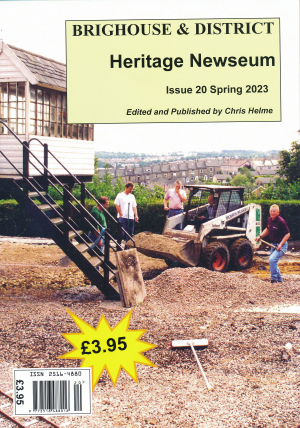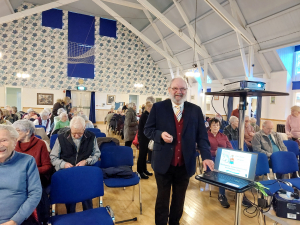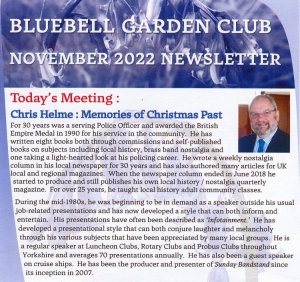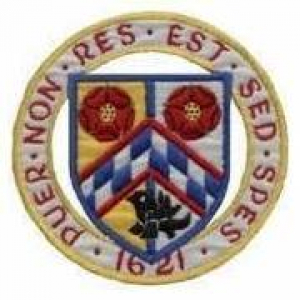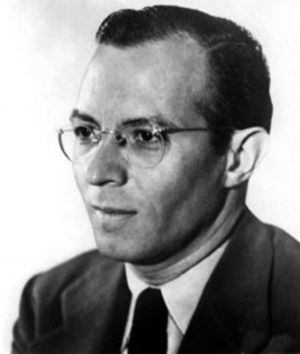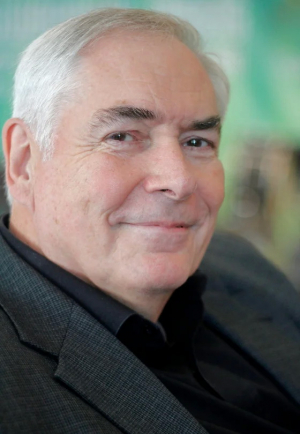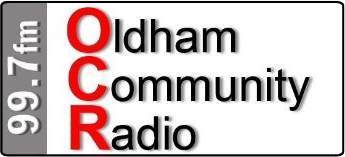
Talk Subjects
Chris Helme
William James Mathias CBE (1 November 1934 – 29 July 1992) was a Welsh composer noted for choral works. He was born in Whitland, Carmarthenshire. A child prodigy, he started playing the piano at the age of three and began composing at the age of five. At Aberystwyth University Mathias was a member of the Elizabethan Madrigal Singers and wrote 'Gloria in Excelsis Deo' for them in 1954. He studied at the Royal Academy of Music under Lennox Berkeley, where he was elected a Fellow in 1965. In 1968, he was awarded the Bax Society Prize of the Harriet Cohen International Music Award. He was professor of music and head of department in the University of Wales, Bangor, from 1970 until 1988.
His compositions include large scale works, including an opera, The Servants (1980), three symphonies and three piano concertos. Much of his music was written for the Anglican choral tradition, most famously the anthem Let the people praise Thee, O God written for the July 1981 royal wedding of the Prince and Princess of Wales, which had a television audience of an estimated one billion people worldwide.
Mathias wrote his Sinfonietta – initially called Dance Suite – for the Leicestershire Schools Symphony Orchestra (LSSO) in late 1966, and it received its first performance at Leicester De Montfort Hall during the 1967 Schools Festival. It was also included in the orchestra's tour programme for Denmark and Germany later in the year. The LSSO made the first commercial recording of Sinfonietta for the Pye Golden Guinea label in July 1967 under the direction of the composer.
Hew only wrote one piece for brass bands 'Vivat Regina Suite for Brass Band Op 75' in 1977 and we are featuring it on this week’s show.
He founded the North Wales International Music Festival in St Asaph in 1972 and directed it until his death, aged 57, in 1992.
He died at Menai Bridge, Gwynedd and is buried at St Asaph Cathedral, St Asaph, Denbighshire, North Wales.
Sigmund Romberg (July 29, 1887 – November 9, 1951) was born in Hungary as Siegmund Rosenberg. He learned to play the violin at six, and piano at eight years of age. He enrolled at Osijek gymnasium in 1897, where he was a member of the high school orchestra. He went to Vienna to study engineering, but he also took composition lessons while living there. In June 1909, he boarded the SS Oceanic as a second-class cabin passenger, sailing from the Port of Southampton, England, to the Port of New York. After a brief stint working in a pencil factory in New York, he was employed as a pianist in cafés and restaurants.
He eventually founded his own orchestra and published a few songs, which, despite their limited success, brought him to the attention of the Shubert brothers, who in 1914 hired him to write music for their Broadway theatre shows. That year he wrote his first successful Broadway revue, The Whirl of the World. He then contributed songs to several American musical adaptations of Viennese operettas, including the successful The Blue Paradise (1915). Even more successful was the musical Maytime, in 1917. Both involved love across generations and included nostalgic waltzes, along with more modern American dance music. At the same time, Romberg contributed songs to Shubert’s popular revues The Passing Show of 1916 and The Passing Show of 1918 and to two vehicles for Al Jolson: Robinson Crusoe, Jr. (1916), an extravaganza burlesque on the familiar story, and Sinbad (1918), an Arabian Nights-themed musical. Romberg wrote another Jolson vehicle in 1921, Bombo. He wrote the music for the musical comedy Poor Little Ritz Girl, which also had songs by Richard Rodgers.
His adaptation of melodies by Franz Schubert for Blossom Time (1921, produced in the UK as Lilac Time) was a great success. He subsequently wrote his best-known operettas, The Student Prince (1924), The Desert Song (1926) and The New Moon (1928), which are in a style similar to the Viennese operettas of Franz Lehar. He also wrote Princess Flavia (1925), an operetta based on The Prisoner of Zenda. His other works, My Maryland (1927), a successful romance; Rosalie (1928), together with George Gershwin; and May Wine (1935), with lyrics by Oscar Hammerstein II, about a blackmail plot; and Up in Central Park (1945), are closer to the American musical in style. Romberg also wrote a number of film scores and adapted his own work for film.
Columbia Records asked Romberg to conduct orchestral arrangements of his music (which he had played in concerts) for a series of recordings from 1945 to 1950 that were issued both on 78-rpm and 33-1/3 rpm discs. These performances are now prized by record collectors. Naxos Records digitally remastered the recordings and issued them in the U.K. (They cannot be released in the U.S. because Sony Music Entertainment, which is a parent company of Columbia Records, holds the copyright for their American release.) Much of Romberg's music, including extensive excerpts from his operettas, was released on LP during the 1950s and 1960s, especially by Columbia, Capitol, and RCA Victor. Nelson Eddy and Jeanette MacDonald, who appeared in an MGM adaptation of The New Moon in 1940, regularly recorded and performed his music. There have also been periodic revivals of the operettas.
Romberg died in 1951, aged 64, of a stroke at his Ritz Towers Hotel suite in New York City and was interred in the Ferncliff Cemetery in Hartsdale, New York.
On this week's show we are featuring Serenade from the Student Prince, played by the National Band of New Zealand conducted by K.G.L.Smith in 1953.
Enjoy the show...
Now last week's radio show is out of the way its prep time for this week's speaking engagements.
.Monday night it's off to the outer reaches of Huddersfield to Marsden Mechanic's Institute and share my Introduction to the World of Brass Bands. The last time I was out Marsden way would be about 60 years ago when our youth club went open water swimming in a reservoir out that way.
Tuesday - Back to Huddersfield to a church and share 'How we used to live', the members are going to enjoy this one. No time to waste must get back ASAP for a zoom dry-run with Skegness Probus Club.
Wednesday - an evening with the Cleckheaton and District Rotary Club - it's the pirate presentation at this one which should go down well with the members.
Thursday and we off again this time to Pudsey Civic Society to share the lighter side of my policing years - back to the old days including the short time I spent in Leeds and having to attend a four hour course on how the new money will work - decimalisation February 15, 1971 - can you remember that day?
Friday and its back to prep the new radio show for Sunday.
It's all go, you have to keep busy...
Jose Padilla Sanchez was a music composer, he was born in 1889 in Almeria, Spain. At 14 years old, he directed his own composition, he moved to Madrid to study music and piano. Eventually he left left for Barcelona, where he led a new life with other influences and contacts such as Picasso. Aged 23, he moved to Buenos Aires to be the orchestra director of the Ursula Lopez company.
He had several great hits including El Relicario. He was familiar to the music scene in Paris, his songs were played in the Casino, the Folies Bergere and the Moulin Rouge.
He was a very prolific composer, his songs were part of 35 films and he composed different types of music: religious, musicals, zarzuela and operetta.
In 1935, the City Council of Almeria honoured him by naming him their favourite son. He died in Madrid in 1960. Almeria’s auditorium is named in his honour Auditorium Maestro Padilla.
On this week's show we are playing his very popular El Relicario.
The latest issue of my Brighouse and Distrtict Heritage Newseum quarterly magazine is now available.
It can be purchased at the following outlets:
Here is issue number 20 of my magazine Brighouse and District Heritage Newseum which is now available. I have copies of previous magaiznes available
It can be purchased at Harrison Lord, Bradford Road: Kitson’s Newsagents, Commercial Street; Kershaw’s Garden Centre, Halifax Road; Hipperholme News, Hipperholme; Bailiff Bridge Post office, Cooperative Buildings; Woodhouse Stores, Woodhouse Lane and at The Secret Tearooms on Bethel Street.
The magazine has 28 pages from cover to cover with a number of the pages now being in colour.
A single issue of the magazine is £3.95 +£1.70 p/p = £5.65 - The 4 issue subscription is £22.60 which also includes p/p.
Digital Copies are now available.
IT IS ALSO AVAILABLE THROUGH MY ONLINE SHOP.
It was in 2020 when John Howarth, the association secretary had to cancel the Old Rastrickians Association annual dinner, which was planned for the April, with no one knowing if or when events like the annual dinner would be back on the calendar.
Jerome Moross (August 1, 1913 – July 25, 1983) was an American composer best known for his music for film and television. He also composed works for symphony orchestras, chamber ensembles, soloists and musical theatre, as well as orchestrating scores for other composers.
He was born in Brooklyn, New York City, United States, in 1913 to Jewish parents: Mollie (Greenberg) Moross, born in New York, and Samuel Moross, born in Russia. He became a talented piano player and composed music for the theatre. During his early years, Moross met and became lifelong friends with Bernard Herrmann. In 1931, he met Aaron Copland and joined his Young Composers Group, whose members also included Herrmann. Copland supported his work and Herrmann provided him an introduction to the entertainment media, beginning with the composition of music cues for radio shows in 1935. In the 1940s he began to work in Hollywood, California, where he would compose the music scores for sixteen films from 1948 to 1969.
In 1956 he composed the score for the World War II drama The Shark Fighters possibly traveling to Cuba with the film company. The score is distinctive in its use of ethnic themes featuring syncopation and percussion instruments that stress the ostinato rhythm that soon became the signature style element of his scores for many westerns.
His best-known film score is that for the 1958 movie The Big Country, for which he was nominated for an Academy Award for Best Original Score. According to Moross, he composed the main title after recalling a walk he took in the flatlands around Albuquerque, New Mexico, during a visit in October 1936, shortly before he moved to Hollywood.
His other works include the music for the films The Proud Rebel (1958), The Mountain Road (1951), The Adventures of Huckleberry Finn (1960), Five Finger Exercise (1962), The Cardinal (1963), The War Lord (1965), Rachel, Rachel (1968), The Valley of Gwangi (1969) and Hail, Hero! (1969). He also composed the main theme for the 3rd–8th seasons of the television western series Wagon Train, the theme of which was based on his score for the 1959 historical western The Jayhawkers!
Moross wrote the music for the musical The Golden Apple, which premiered Off-Broadway in 1954 and then transferred to Broadway. Its best-known song was "Lazy Afternoon."
He also orchestrated for other composers, usually uncredited, including such films as Our Town for Copland and The Best Years of Our Lives for Hugo Friedhofer.
Moross's concert works included a sonata for a piano duet and string quartet, and a symphony that was premiered by conductor Sir Thomas Beecham on 18 October 1943 in Seattle, Washington. It featured an "intrinsically American sound" that characterised all of Moross's compositions in every genre and form.
In 1939, in New York City, he married Hazel Abrams (1905-1983), the daughter of Jewish immigrants from Russia. Moross died in Miami in 1983 of congestive heart failure following a stroke. He was buried in Mount Ararat Cemetery, East Farmingdale, Suffolk County, New York, next to Hazel.
On this week's show we are featuring the main theme to The Big Country played by the Brighouse and Rastrick Band conducted by David Hirst.
Gareth Wood ( Cilfynydd near Pontypridd, Wales, 1950 ) is a Welsh composer , music educator and conductor. He studied composition and double bass at the Royal Academy of Music in London. In 1972 he became a member of the Royal Philharmonic Orchestra in London and work with this orchestra familiar with the most important music festivals and with great conductors, such as Leopold Stokowski, Rudolf Kempe, Karl Böhm, Bernard Haitink, Sir Georg Solti, and others. From 1991 to 1994 he was chairman of the board of the Royal Philharmonic Orchestra.
In 1975 he became known as a composer with the overture Tombstone - Arizona, which was performed at London's Royal Albert Hall during the National Brass Band Festival. It followed compulsory works for the Butlins Youth Band Contest in 1977 and the New Zealand Brass Band Championships in 1980 as well as for the European Championships in 1992. In Ipswich his overture Suffolk Punch was performed by the Royal Philharmonic Orchestra in 1981.
Here are just some of the compositions from the pen of Gareth Wood, with a number of them being played on this show over the years. Some of them will be familiar to many of our listeners:
- 1975 Tombstone - Arizona, for brass band
- 1992 Five Blooms in a Welch Garden, for brass band (compulsory work at the 1992 European Brass Band Championships in Cardiff )
- 1999 Concerto, for trombone and brass band
- 2001 Quintet for brass, for brass quintet and brass band
- 2006 Concerto, for tenor horn and brass band
- Coliseum, for brass band
- Concertino, for horn and brass band
- Concerto, for harp and brass band
- Concerto, for trumpet and brass band
- Concerto, for tuba and brass band
- Culloden Moor, for brass band
- Hinemoa, for brass band
- Introduction and Allegro, for brass band
- Japanese Slumber Song, for brass band
- Margam stones, for brass band
- Nocturnal, for brass band
- Nocturne, for flugelhorn (flugelhorn) and brass band
- Salome, rhapsody for brass band
- Songs Radiant Fair, for brass band
- Sosban Fach, for brass band
- The Margam Stones, for brass band
- This Happy Island, for brass band
- 2009 Mist of the Forest
On this week's show we are featuring Mist of the Forest played by the Cory Band in 2009.
The inspiration for this work is a part of South Wales where the composer spent his childhood. The Afan Forest Park is an old mining area that has been extensively reclaimed and transformed through one of the earliest reclamation schemes in Wales. The forest is picturesque all year round, but is particularly beautiful at dawn in the summer when the moisture of the sea in Swansea Bay and the heat from the golden sun combines to create a unique mist.
The music seeks to capture the undulating effects of the changing density of the mist as the sun gradually burns away the moisture.Mist of the Forest also forms the penultimate movement of the composer's extended work for brass band, Brass Triumphant - a work composed for the Cory Band during their 125th anniversary year of 2009.
Enjoy the show....
Talks Available
All the presentations are timed to last up to an hour except where shown - questions are gladly taken after the presentation. All have been presented to male, female and mixed audiences of varying age groups.
-
A Postcard from the Past
The Sunny Vale Pleasure Gardens, Halifax - Yorkshire’s Alton Towers of the…
-
All in a Days Work
Reminiscences from 30 years in the Police Service – (humorous lecture presentation)…
-
Legends from the world of Brass Bands
(Info-tainment – digital slides & music) – 1 hour presentation.
-
A Week in May
A story based on the Murder of Lord Frederick Cavendish (of the…
- Memories of Christmas Past
-
The Road to Publication
In 1979 I was asked to assist in presenting a series of…
-
How we used to live
We have all seen and experienced changes in our lives. Bring back…
- Holiday Memories from the Past
-
Other Folks Rubbish (Not suited to a Zoom presentation)
With a local history theme… – (thought provoking humorous lecture presentation) –…
- So you want to be a Pirate ? - The life of a Pirate was not all that it seemed
- Superstitions, New Year Resolutions and the Origins of St Valentine's Day
- Brighouse at Work
-
Sorry but I am not able to accept any more face to face talk bookings at the present time ONLY ZOOM TALKS


